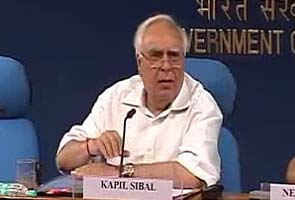New Delhi: The council of IITs today proposed a pan-India common entrance test for admission to engineering programmes possibly from 2013.
After a five-hour meeting of the council, Human Resource Development Minister Kapil Sibal, said , "We have decided there shall be one exam. Subject to the clearance of the Central Advisory Board of Education (CABE) committee and subject to the clearance of the state ministers we will try and put that into operations from 2013."
The government had constituted a committee under Secretary to the department of science and technology T Ramasami to examine implementation of a single entrance test. Six options were deliberated upon for the test and Ramasami has been asked to finalise one of these
within a month.
On the issue of hiking tuition fee as recommended by the Anil Kakodkar committee, Mr Sibal made it clear that "fee would remain the same at Rs. 50,000 per annum" but added a student,
excluding STs and OBCs, would 'pay back' the amount which is the difference between the fee deposited and what the IIT spends on him.
The cost factor for an IIT for each students at present stands at around Rs. 8 lakh against Rs. 2 lakh paid over the entire duration of the B. Tech programme. The HRD Minister said implementation of the Kakodkar committee recommendation, which had sought to raise the tuition fee to Rs. 2 lakh per annum, was "not possible" with interest of all sections of the society kept in mind.
Mr Sibal said that the 'pay back' scheme won't be applicable to those who enroll into M. Tech programme, those who do PhD and to even those who are recruited as faculty in IIT.The Finance Ministry's nod would be sought before putting in effect the scheme, Mr Sibal said.
On changes in the admission process based on the common entrance test, Mr Sibal said an all-India merit list will be prepared based on the combined weightage given to class XII exam and to a common entrance test. The test will examine a students logic and non-subject matters. Weightage would be given to the marks obtained in class XII boards after the results are equalised for which Indian Statistical Institute will put in place a mathematical formula for equalisation.
The minister said the council was aware of the problems that states like Andhra Pradesh faced while implementing the equalisation procedure. Mr Sibal said Indian Statistical Institute's formula would be based on the data of various boards collected over the past
four years to make it an efficient equalisation model.
The meeting of the council attended by the directors of all IITs took a view of several systems for conduct of the test where it also decided to produce 40,000 PhDs by 2020 and create a pool of 16,000 faculties by then.
Mr Sibal exuded confidence on the viability of the 'pay back' scheme in instalments, saying the DMAT system will be utilised to execute the plan. DMAT is a process for the establishment of a national database of academic qualifications -- currently underway -- in an electronic format by an identified, registered depository. The dematerialisation of certificates would ensure confidentiality, authenticity and fidelity, enabling online verification and easy retrieval of academic qualifications.

No comments:
Post a Comment